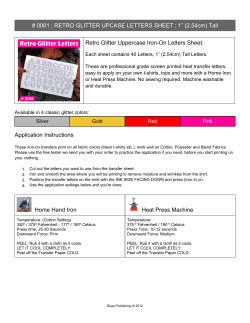
Hemoglobin H Disease What is Hemoglobin H (Hgb H) Disease?
Hemoglobin H Disease What is Hemoglobin H (Hgb H) Disease? Hgb H disease is an inherited anemia found mainly in people of Asian and Southeast Asian descent. It is a form of alpha thalassemia that affects the body’s ability to make healthy red blood cells. Red blood cells carry oxygen throughout the body by attaching the oxygen to a protein called “hemoglobin.” To make normal hemoglobin the body needs 4 alpha genes and 2 beta genes. People with Hgb H disease have only 1 alpha gene (3 missing). This makes the red blood cells more fragile, causing them to break down more quickly than normal red blood cells. Hemoglobin H – Constant Spring disease is a more severe form of Hgb H disease. In addition to having only 1 working alpha gene, these children also have a hemoglobin mutation called ‘Constant Spring’. This makes the hemoglobin even more unstable. These children generally have a more severe course. Generally, people with Hgb H disease live long and productive lives. However, there are some complications that you should know about if your child has Hgb H disease or Hgb H – Constant Spring disease. What does this mean for my child? Splenomegaly (Enlarged Spleen) The spleen is an organ that filters damaged red blood cells from the blood. Your child has a many damaged red cells, so the spleen must work harder and can be enlarged. This may cause no symptoms, or result in severe anemia, abdominal pain, fatigue and frequent infections. In some cases the spleen may need to be removed. Aplastic Crisis An aplastic crisis occurs when the bone marrow “shuts down” and fails to make red blood cells. Signs of aplastic anemia include extreme fatigue, dizziness, and pale skin. Should your child experience these symptoms, contact the hematology team immediately. Your child might need further tests, and possibly a blood transfusion to help the body recover. Delayed Growth Your child has lower levels of hemoglobin and slightly lower levels of oxygen throughout the body. This may cause your child to reach puberty slightly later than their peers, or have problems with growth. Your child will see an endocrinologist (growth doctor) if there is a concern. Osteoporosis (Low Bone Density) The same anemia that can cause delayed growth can cause bones to be thinner than normal. It is important your child participates regularly in weight-bearing exercise like jogging and team sports. Your child should also take calcium and vitamin D supplements every day to help build strong, healthy bones. Gallstones When red blood cells break down, they release a substance called “bilirubin” into the blood. Children with Hgb H disease have more red blood cells breaking down, and higher levels of bilirubin. This bilirubin can build up and form small “stones” in the gallbladder, called gallstones, which can cause abdominal pain. Contact the hematology team immediately if your child experiences unusual pain in the upper right side of the abdomen. Iron Overload Adults with Hgb H disease are more prone to iron overload, a condition of excess iron in the body that can damage the liver and heart. Unnecessary iron supplements can increase the risk of iron overload. Your child should not take iron supplements unless recommended by the hematology team. Hemolysis (Red Cell Breakdown) Certain medications, foods and chemicals can cause red blood cells to break down more quickly, causing severe anemia that requires emergency medical attention. Your child should avoid the following: Pain relievers: Aspirin Phenacetin Acetanilide Antibiotics: Nalidixic acid Nitrofurantoin Furazolidone Chloramphenicol B-aminosalicylic acid Ciprofloxacin Doxycycline Other products: Toluidine blue dye Methylene blue dye Antimalarials: Primaquine Chloroquine Hydroxychloroquine Sulfa drugs: Sulfacetamide (eye drops) Sulfanilamide Sulfamethoxazole Sulfapyridine Sulfasalazine Sulfisoxazole Dapsone Tuberculosis drugs: Isoniazid Rifampin Trinitrotoluene (TNT) Naphthalene/mothballs Fava beans Other medications: Pyrimethamine Vitamin K analogs Phenazopyridine Quinidine Gluconate Genetic Implications Hgb H is inherited, which means it is passed from parent to child. Your child can pass it on to his/her children. Depending on his/her partner’s genetic make-up, there is a risk that their child will have Hgb H disease or a more severe form of thalassemia. Your child should seek genetic counseling prior to having children. When should I call the doctor? Call the hematology team if your child has any of the following: Extreme fatigue Pale/yellow skin or yellowish eyes Stomach and/or back pain Dark or urine Has contact with any of the substances listed above For more information contact: Heather McCartney, BSN RN Hemoglobinopathies Nurse Clinician, BC Children’s Hospital Office: (604) 875-2345 ext 7103 Pager: (604) 686-3551 Email: hmccartney@cw.bc.ca
© Copyright 2025





















